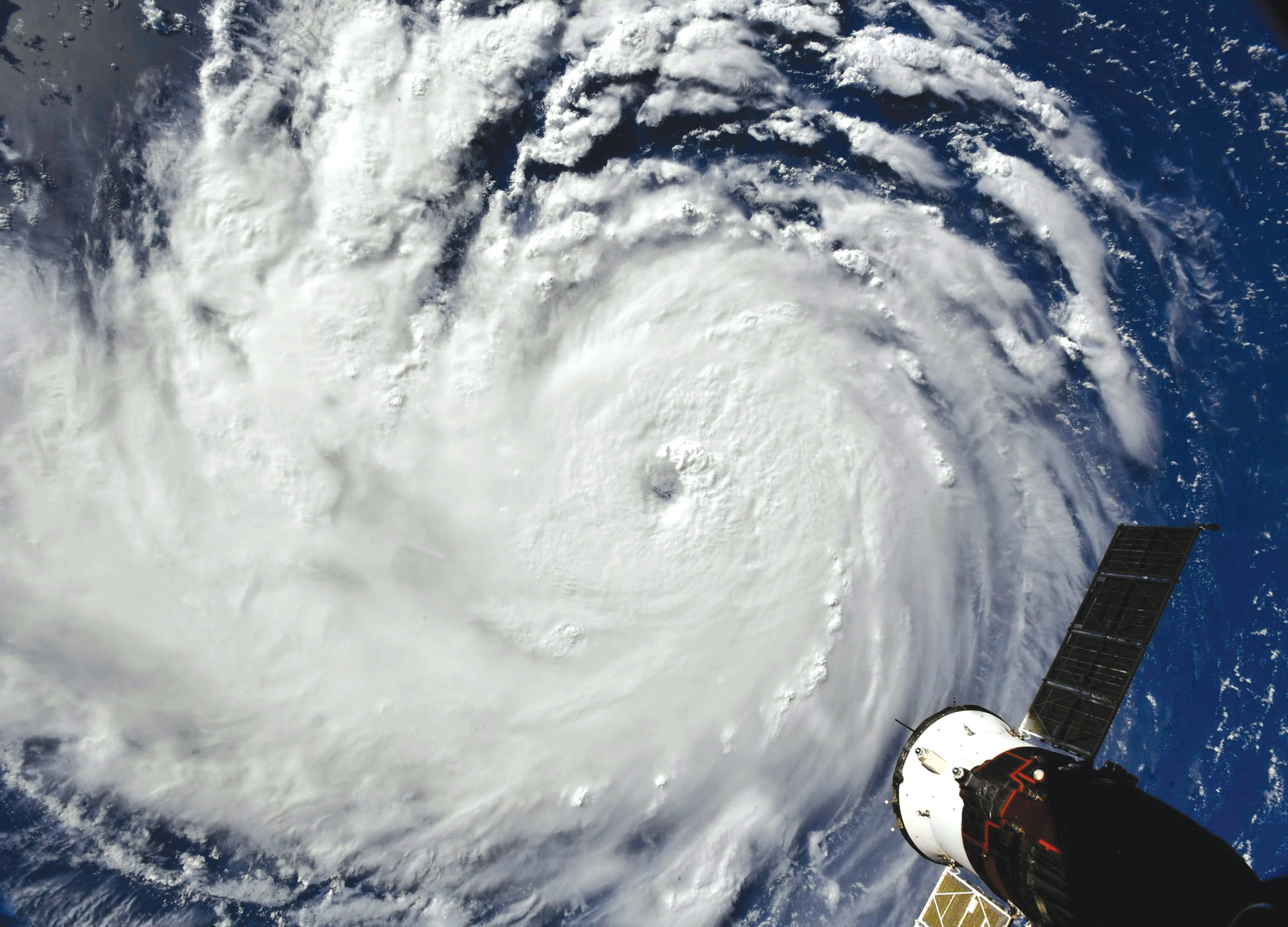Keep an eye on Florence: Schools, state government to close as storm barrels toward Carolinas
At a minimum
Water - Two gallons per person per day for at least three days for drinking and sanitation. Fill a bathtub to use for toilet flushing. Buy plastic bottled water or store in plastic containers, not glass.
Food - At least a three-day supply of non-perishable meals
Battery-powered or hand-crank radio and a NOAA Weather Radio with tone alert and extra batteries for both
Flashlight and extra batteries
First aid kit
Whistle to signal for help
Moist towelettes, garbage bags and plastic ties for personal sanitation
Wrench or pliers to turn off utilities
Manual can opener for food if
non-perishables contain canned items
Local maps
Cellphone with chargers
Prescription medications and glasses
Infant formula and diapers
Pet food and water
Important family documents such as copies of insurance policies, ID and bank account records in a waterproof, portable container
Family emergency contact information
Cash or traveler's checks and change
Additional items to consider
Sleeping bag or blanket for each person
Complete change of clothing, including a long-sleeved shirt, long pants and sturdy shoes
Fire extinguisher
Multipurpose tool
Matches in a waterproof container
Duct tape
Dust mask to filter contaminated air
Feminine products and hygiene items
Mess kits, paper cups, plates and plastic utensils, paper towels
Paper and pencil
Books, games, puzzles or other activities for children
Source and more information: www.scemd.org
Bring loose items inside - Lawn furniture, trash cans, toys, garden equipment, clotheslines, hanging plants and any other objects that may fly around and strike property should be secured or brought inside.
Leave trees and shrubs alone - If you have not already cut away dead or diseased branches or limbs from trees and shrubs, do not now. Rubbish collection services will not have time before the storm to pick the piles up.
Turn off electricity and water if you're leaving town - If you're evacuating, turn off the electricity at the main fuse or breaker, and turn off water at the main valve before leaving.
Leave natural gas on - Unless local officials advise otherwise, leave natural gas on to be able to use for heating and cooking when you return home. If you turn it off, a licensed professional is required to turn it back on, which could take weeks after a storm.
Move valuables to the center or top of your home - Move TV sets, computers and other electronics away from windows and to higher levels of the house. Wrap them in sheets, blankets or burlap.
Source: Sumter County Sheriff's Office
kayla@theitem.com
While the exact intensity and amount of wind, rain and other effects are not yet clear, it seems likely that Hurricane Florence will impact Sumter County later this week.
Florence was upgraded to a Category 4-strength hurricane Monday, which is considered a major hurricane, and local and state officials began preparations to allow South Carolinians time to get out of the storm's path or batten down the hatches to ride it through. "This may be the first Category 4 hurricane to strike South Carolina since Hugo," Gov. Henry McMaster said at a Monday afternoon press conference with state emergency management officials. "We're in for a real episode here." As of its 5 p.m. Monday update, the National Oceanic and Atmospheric Administration said the storm was moving about 13 miles per hour to the west-northwest and that an increase in strength and size is expected. Data from NOAA aircraft indicate the maximum sustained winds have been recorded near 140 mph with higher gusts. "Further strengthening is anticipated, and Florence is expected to be an extremely dangerous major hurricane through Thursday," the update said. While the eye is expected to make landfall on Thursday, officials are warning that storm surge, wind and rain will begin earlier. Erik Hayes, director of the Sumter Emergency Management Office, which serves both the city and the county, urged residents to be mindful that though the track may show it directly striking farther north, the track can change, and the effects will be felt away from the eye. Hurricane-force winds extend outward up to 40 miles from the center of the storm, and tropical storm-force winds do so up to 150 miles, according to the NOAA and Hayes. To prepare for the effects, McMaster issued an executive order to close schools and state government offices for non-essential personnel in 26 counties including Sumter, Lee and Clarendon. He also issued mandatory evacuations for the coast through eight counties from Beaufort to Charleston to Myrtle Beach. Road reversals on Interstate 26 to Charleston and U.S. 501 to Myrtle Beach will go into effect today at noon to help speed up the evacuation process of up to one million residents, according to McMaster. Officials will be ready to do so but will make the decision today at noon whether to reverse S.C. 278 and S.C. 21 to Beaufort. All reversals will make it so the highways go west on all lanes of the road. "Evacuations are inconvenient, but we do not want to risk one South Carolina life in this hurricane. So we're willing to suffer those inconveniences," McMaster said. Sumter's Hayes said while it is still early, prepare now and make sure to get information from a trusted source like local news or the NOAA. "We are bracing as a county and city as if a hurricane will hit us," Hayes said. "We plan for the worst and are still hoping for the best." Evacuation and shelter information To find out if you are included in the evacuation, visit https://scemd.org/prepare/know-your-zone/. The SC Manager mobile app can be downloaded and used to find shelters as soon as they are opened. What are the main threats? Even if Florence does not make landfall with its eye over Sumter or even in South Carolina, tropical storm-force effects can still create life-threatening situations. The main hazards from a tropical cyclone (hurricane, tropical storm or tropical depression) are: Storm surge flooding - This is typically the leading cause of hurricane-related deaths in the United States and affects coastal areas when the sea level rises so rapidly that it floods buildings, roads and anything in its path as far as several miles inland, especially along bays, rivers and estuaries, according to the National Weather Service. Flooding from heavy rains is the second-leading cause of hurricane-related deaths, the NWS says. Torrential rains can cause flooding hundreds of miles inland and can last for days after the storm has passed. Do not drive through flooded roads. If you can't see the bottom of the road, avoid it. Winds can destroy buildings - mobile homes are especially vulnerable. Signs, roofs and other items left outside can become flying missiles during hurricanes. Tornadoes can accompany hurricanes and typically form in the outer bands well away from the eye of the storm.
Food safety when the power goes out
The USDA Food Safety and Inspection Service recommends consumers take the following steps to reduce food waste and the risk of food-borne illness during weather events:
Before a power outage
* Keep appliance thermometers in the refrigerator and freezer to ensure temperatures remain food-safe during an outage. Safe temperatures are 40 degrees or lower in the refrigerator and 0 degrees or lower in the freezer.
* Freeze water in 1-quart plastic bags or small containers to use as ice packs if the power goes out.
* Freeze refrigerated items such as milk and leftovers you may not need immediately to keep them at a safe temperature longer.
* Have coolers on hand to help keep food cold.
* Group food together in the freezer - the igloo effect helps keep food cold longer.
* Try to have as much non-perishable food as possible so less is wasted during an outage.
During a power outage
* Keep refrigerator and freezer doors closed as much as possible. A refrigerator will keep food cold for about four hours if it is kept shut, and a full freezer will do so for about 48 hours.
* Put meat and poultry to one side of the freezer or on a tray to prevent cross-contamination of thawing juices.
Food safety after a flood
* Do not eat any food that came in contact with flood water, including raw produce and milk and egg cartons.
* Discard any food not in a waterproof container that may have come into contact with flood water, including plastic wrap, cardboard boxes, snap lids, pull tops or screw caps.
* Throw out any damaged canned food, including from swelling, leakage, punctures, fractures or rusting.
Pet safety during a hurricane
Take pets with you, and plan for an evacuation ahead of time.
Make sure you know whether a shelter or hotel will take pets, just service animals or no animals at all. Try to stay with friends or family that are OK with pets. Pack their food, water and any crates, toys and any beds or blankets.
For livestock, visit the Clemson Livestock-Poultry Health at www.clemson.edu/public/lph for a list of emergency resources and information to help with all types of pets and livestock and what to do.
If evacuating with horses, be on the road a day or two ahead of time.
The sheriff's office recommends researching www.hotelpetsallowed.com to find which listings allow pets.
Help your linemen
Electric company workers put themselves in danger when they try to restore power to neighborhoods during hurricanes, and one Sumter-based cooperative leader gave a tip that could help linemen monitor power restorations.
Leave porch lights on throughout the hurricane so when the power goes out and linemen respond to the area, they will see the power come back on when the outdoor lights return, said Charlie Allen, CEO of Black River Electric Cooperative.
Erik Hayes, director of the Sumter County Emergency Management Office, which serves, both the city and county, said power outages should be reported to the homeowner's electric company - not 911.
Disaster Distress Helpline
Call 1-900-985-5990 for immediate counseling to anyone who is seeking help in coping with the mental or emotional effects caused by Hurricane Florence in the Carolinas and Virginia. The helpline is open 24 hours a day, seven days a week and provides confidential counseling, referrals and access to other needed support groups.
More Articles to Read




